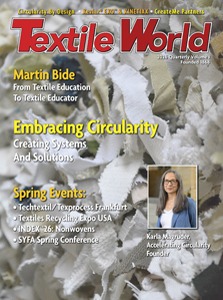Kraig Biocraft Laboratories Inc., Lansing, Mich. — developer of Monster Silk™ recombinant spider
silk technology — and New Ipswich, N.H.-based advanced technical textiles and protective materials
developer and manufacturer Warwick Mills Inc. have signed a collaborative development agreement
under which the two companies will codevelop and commercialize Monster Silk-based advanced textile
products.
The initial focus of the partnership will be to weave and test Monster Silk-based textiles
for near-term applications. Kraig and Warwick will jointly own any product-related intellectual
property that results from the collaboration.
“This collaborative undertaking represents a huge step forward in our commercialization
efforts,” said Kim Thompson, CEO and founder, Kraig Biocraft. “The pairing of Kraig’s spider silk
technology with Warwick’s world-class technical textiles applications engineering and weaving
abilities is a bold move, which we believe will enhance and accelerate the penetration of spider
silk into technical textile markets.”
Monster Silk is produced by transgenic silkworms whose genetic makeup includes a combination
of certain spider silk proteins with silkworm proteins. The silk produced by these silkworms
contains only a small percentage of spider silk protein, but it exhibits significantly increased
strength and elasticity when compared to conventional silk.
Kraig has set up a pilot spider silk production operation overseas in a country that offers a
trained workforce for the production of silk. “We’ve reached the point where we’re ready to ramp up
to commercial-scale production,” Thompson said. “Now, we’re raising the silkworms primarily to
multiply instead of harvesting them. Each pair of silkworms produces 300 to 500 eggs. We get a new
generation roughly every 50 days, so we can go from 100,000 to many millions of silkworms in just a
few months and have the capacity to begin pumping material to Warwick and ultimately to other
partners.”
Thompson said that in addition to its technical expertise to work with advanced materials,
Warwick’s capability to use small quantities of material in its product development efforts has
enabled Kraig to enter now into a binding agreement without the need to provide the relatively
large material quantities required by many other potential partners to initiate development.
“Warwick presents a more immediate opportunity for us,” he noted. “We aren’t interested in just
knitting or weaving something to be producing something. We’re interested in working with someone
who could take the material and engineer something beautiful, and that’s where we are with
Warwick.”
Warwick is known for its production of ballistic, puncture-resistant and high-tensile
materials for defense, aerospace, safety and law enforcement applications. “The collaboration will
look at those applications, but we are hopeful it will also open up other opportunities beyond
protective materials,” Thompson said.
“The future of textiles will continue to be driven by innovation and we believe that our
textile engineering capabilities and Kraig’s fibers can change the game in some important
applications,” said Warwick President Charles Howland. “These technologies could potentially result
in higher performance textiles, which would enable very advanced safety and military equipment.
This collaborative agreement is a big step forward in the development of exciting new textiles with
potential applications for the technical textiles and protective textiles marketplace.”
Kraig also has signed a memorandum of understanding with Spring City, Tenn.-based SSM
Industries Inc. — a knitter and weaver of personal protection fabrics — and ultimately expects to
move forward with some development initiatives with SSM as well.
October 22, 2013




